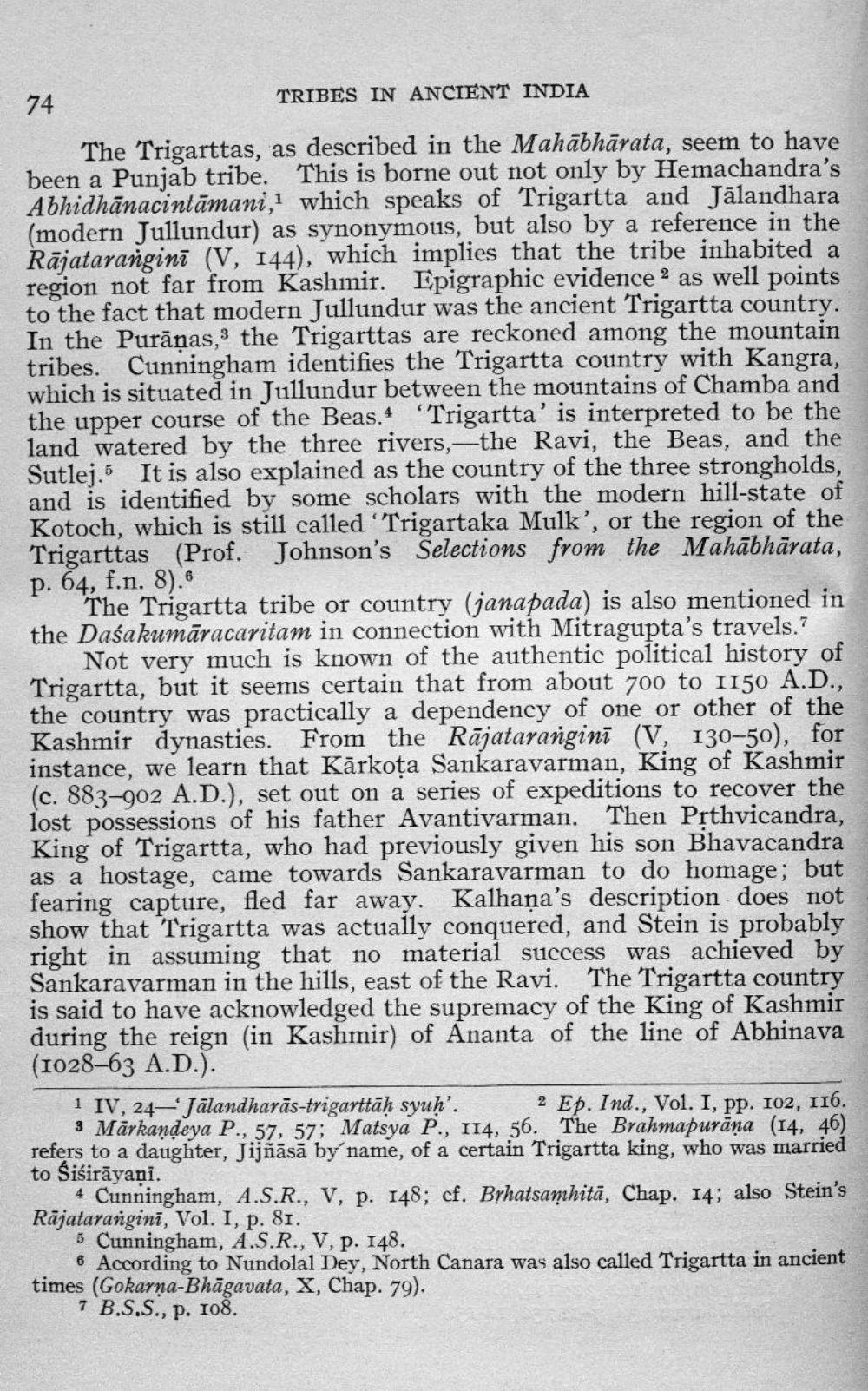________________
74
TRIBES IN ANCIENT INDIA The Trigarttas, as described in the Mahābhārata, seem to have been a Punjab tribe. This is borne out not only by Hemachandra's Abhidhānacintāmani, which speaks of Trigartta and Jālandhara (modern Jullundur) as synonymous, but also by a reference in the Rājatarangini (V, 144), which implies that the tribe inhabited a region not far from Kashmir. Epigraphic evidence 2 as well points to the fact that modern Jullundur was the ancient Trigartta country. In the Purāṇas, the Trigarttas are reckoned among the mountain tribes. Cunningham identifies the Trigartta country with Kangra, which is situated in Jullundur between the mountains of Chamba and the upper course of the Beas. 4 “Trigartta' is interpreted to be the land watered by the three rivers, the Ravi, the Beas, and the Sutlej.5 It is also explained as the country of the three strongholds, and is identified by some scholars with the modern hill-state of Kotoch, which is still called 'Trigartaka Mulk', or the region of the Trigarttas (Prof. Johnson's Selections from the Mahābhārata, p. 64, f.n. 8).6
The Trigartta tribe or country (janapada) is also mentioned in the Daśakumāracaritam in connection with Mitragupta's travels.?
Not very much is known of the authentic political history of Trigartta, but it seems certain that from about 700 to 1150 A.D., the country was practically a dependency of one or other of the Kashmir dynasties. From the Rājatarangini (V, 130-50), for instance, we learn that Kārkota Sankaravarman, King of Kashmir (c. 883-902 A.D.), set out on a series of expeditions to recover the lost possessions of his father Avantivarman. Then Prthvicandra, King of Trigartta, who had previously given his son Bhavacandra as a hostage, came towards Sankaravarman to do homage; but fearing capture, fled far away. Kalhaņa's description does not show that Trigartta was actually conquered, and Stein is probably right in assuming that no material success was achieved by Sankaravarman in the hills, east of the Ravi. The Trigartta country is said to have acknowledged the supremacy of the King of Kashmir during the reign in Kashmir) of Ananta of the line of Abhinava (1028-63 A.D.).
1 IV, 24–Jālandharās-trigarttāḥ syuh'. 2 Ep. Ind., Vol. I, pp. 102, 116.
3 Mārkandeya P., 57, 57; Matsya P., 114, 56. The Brahmapurana (14, 46) refers to a daughter, Jijñāsā by name, of a certain Trigartta king, who was married to Siśirāyani.
4 Cunningham, A.S.R., V, p. 148; cf. Byhatsamhitā, Chap. 14; also Stein's Rajatarangini. Vol. I. p. 81.
5 Cunningham, A.S.R., V, p. 148.
6 According to Nundolal Dey, North Canara was also called Trigartta in ancient times (Gokarna-Bhāgavata, X, Chap. 79).
7 B.S.S., p. 108.




